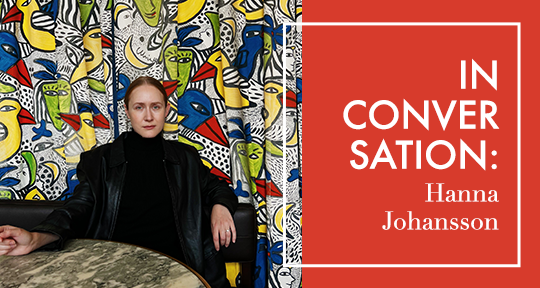In Antiquity, Hanna Johansson unleashes a rapturous, sinuous tale of desire and its reckless vehicle. After falling for an older artist, a misguided journalist follows her and her teenage daughter onto a trip to the Greek islands in an almost-instinctive sense of codependence, and soon the gorgeous shores are turned into a stage of ruins, in which a self-deluding passion lays bear the tensions between the wanting and the wanted. Shifting between the incantatory posturing of someone captivated by the forbidden and the anxious distortions of unreciprocated intimacy, Johansson deftly grows an explosive triangulation in which closeness begets isolation, and isolation begets tragedy. In the following interview, Sofija Popovska speaks to Johansson about Antiquity’s queerness, ancient Greece as a specter, and how the novel considers power.
Sofija Popovska (SP): Firstly, congratulations on your gorgeous debut novel! Before we dive into the text itself, could you tell me a little about how Antiquity came into existence?
Hanna Johansson (HJ): I started writing it seriously in 2018, and I had at that point been trying for a while to write a story about a trio of some sort. I find that kind of social structure to be very interesting and enticing—not the kind of love triangle where two people desire the same person, but a triangle where two people might belong to each other in this obvious, indisputable way, like a couple, or, as in Antiquity, a mother and her daughter, with a third person sort of looking in, desiring their bond more than anything else. I had also had a little bit of a personal crisis in 2016 and went to Ermoupoli for three months and realized pretty quickly that I would like to write something set in that city. It’s so beautiful and glamorous and strange at the same time. So, all of that had been brewing for a couple of years, and then, in the fall of 2018, I moved from Stockholm to a smaller city with my partner, who’s also a writer, while she was getting her MFA. I’m not sure I could have written it without those circumstances—the fact that she was incredibly supportive, and that we were living in a way that left me plenty of time to write.
SP: Described in its promotional materials as a “queer Lolita story” and as reminiscent of Death in Venice, Call Me by Your Name, and The Lover, Antiquity is, from the outset, embedded in a specific literary tradition. Was this cultural situatedness a planned feature? Were you ‘in conversation’ with any of these works—or other texts—during the writing process, and, if so, what effect did you hope to achieve by recasting (and subverting?) their themes and elements in Antiquity?
HJ: Yes, the cultural situatedness was a planned feature, I would say. I was very preoccupied, while I was writing Antiquity, with these sorts of queer or gay tropes—the age gap love story, for instance, which is one, although maybe not very nuanced, way of describing the novels mentioned—but probably even more the story of the guest who overstays their welcome, like Patricia Highsmith’s The Talented Mr. Ripley and Alan Hollinghurst’s The Line of Beauty. I read The Line of Beauty in my late teens and it made a huge impression on me. Saltburn is another example of that trope, to mention something even more current. These are all stories of people who are obsessed with beauty, and who have a desire for luxury, but they also have this seemingly unquenchable thirst for belonging—and an equally intense conviction that they can’t belong anywhere unless they are deceptive and not themselves—and this very much informs the narrator of Antiquity.
READ MORE…


